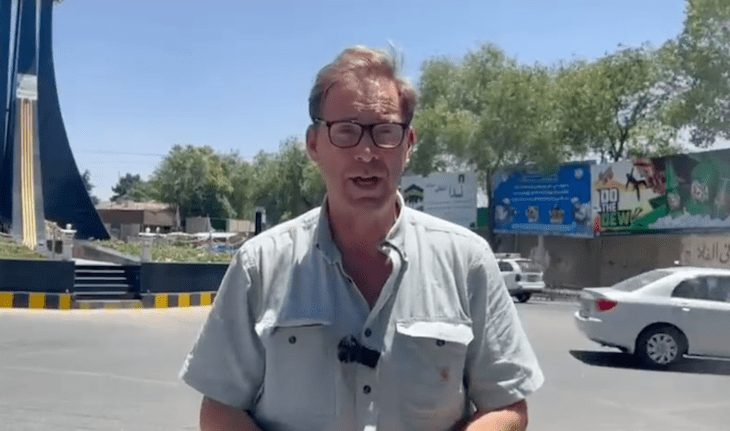It has now been almost two years since the Taliban came to power in Afghanistan. In recent weeks, a number of international assessments have been published looking at the state of the country under their leadership.
One UN report looked at the potential for terrorism in a country where ‘terrorist groups enjoy greater freedom… than at any time in recent history.’ Links between the Taliban and al-Qaeda are said to be ‘strong and symbiotic’, with al-Qaeda ‘rebuilding operational capability’ from its base in Afghanistan.
I understand that Iran has reached out to Afghan warlords from the country’s earlier conflicts to investigate supporting a wider uprising against the Taliban
Another UN report detailed the arbitrary shootings of former government and security personnel, public executions and flogging of ‘adulterers’. It also examined the continuing discrimination against women and girls, with the removal of their educational opportunities and access to almost all jobs. The UN special rapporteur on human rights in Afghanistan, Richard Bennett, called this ‘gender apartheid’. Journalists have been arrested, while a prominent education advocate, Matiullah Wesa, has been held without trial for several months. And so it goes on.
But Tobias Ellwood, the Chair of the Commons Defence Committee, who has just returned from Afghanistan, appears to have visited a different country. In a video posted on twitter, and an article in the Telegraph, Ellwood argues that it is time to recognise the Taliban administration, and reopen the British embassy, which he says was closed ‘for political rather than security reasons.’ After the very brief visit, he said ‘security has vastly improved,’ and detailed ‘game-changing’ improvements in the past two years, in contrast to the 20 years Nato troops were in the country. The growing of opium poppies is banned, and corruption ‘has all but disappeared.’
But Ellwood’s somewhat thin list of supposed improvements includes things, such as the use of solar panels to pump water for irrigation, that were widespread before the Taliban came to power. Furthermore his assertion that the ‘opium trade has all but disappeared’ is simply false. The growing of opium poppies may have stopped, but the Taliban have not interfered with the trade of stockpiled opium. The drugs expert David Mansfield, has said that ‘Although at a 20-year high, opium prices in Afghanistan have been falling since December 2022, suggesting there is significant inventory in the system.’
Ellwood argued that ‘We should now recalibrate the UN Afghan Mission and review our diplomatic approach to Kabul.’ That mission is indeed currently being recalibrated, but not for the reasons he mentions. Because of the Taliban’s unwillingness to accept women staff on UN projects, these schemes are currently operating outside their mandate – which underlined the importance of upholding women’s rights in the country. This is leading to an urgent reassessment of the UN’s options.
Ellwood’s remarks have of course been welcomed by the Taliban, but widely condemned by non-Taliban Afghans. The line that attracted most criticism is Ellwood’s assertion that once we open an embassy, ‘women’s rights may well serve as a negotiation tool for shared understanding.’ Many Afghans do not see women’s rights as something to bargain with. A former MP, Fawzia Koofi, said there that if there were engagement, it had to be based on principles, not by accepting engagement on the Taliban’s terms. ‘Security is not just the absence of war,’ but includes women’s rights, she said. ‘We should stick by our principles.’
A former senior government official, Timor Sharan, described Ellwood’s appeal as ‘appeasement of the Taliban, paving the way for more atrocities.’ And an Afghan journalist, Roh Yakobi, said that after ‘betraying’ Afghanistan, ‘the West cannot afford to push its reputation any lower by recognising a death cult.’
Ellwood is not the only British voice urging recognition of the Taliban. The former Chief of the Defence Staff, Lord David Richards, who commanded Nato forces in Afghanistan, has consistently argued for the West to pragmatically accept that we lost the war.
‘If the West continues to sulk,’ wrote Ellwood, ‘we could be making another blunder which pushes the nation to a fiscal cliff.’ But the reality in Afghanistan actually demands a far more hard-headed approach. The Taliban administration is fractured, riven with internal divisions, and facing increasing opposition inside the country, not only because of its harsh restrictions against women, but because of its failure to represent Afghanistan’s many tribes, other than Pashtuns.
And Ellwood’s Panglossian demand for closer ties with the Taliban comes just as a number of countries who have had closer links are now reconsidering their position in the face of the rising terrorist threat and the instability of the administration. As I reported here earlier this month, Saudi Arabia, Russia and Iran have all downgraded their embassies. I now understand that Iran has reached out to Afghan warlords from the country’s earlier conflicts to investigate supporting a wider uprising against the Taliban.
There is already some armed resistance against the Taliban, and alongside that efforts are being made by those outside Afghanistan to form a united constitutional opposition, preparing for a post-Taliban future. The West would indeed be making a blunder if it ignored these developments, and instead went down the road of recognising a regime that is failing its people.







Comments